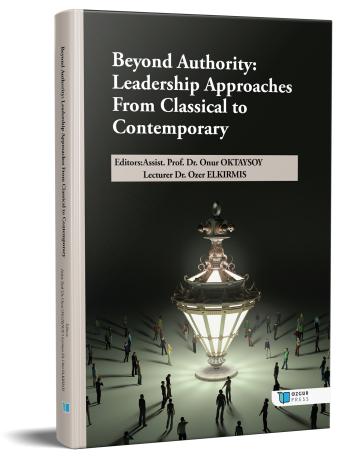
Beyond Authority: Leadership Approaches From Classical to Contemporary
İndir
Özet
Leadership, one of the most controversial and dynamic areas of modern management sciences, is gaining increasing importance every year due to its impact on the sustainability, competitiveness, and human resources of today's organizations. Building on this importance, "Beyond Authority: Leadership Approaches from Classical to Contemporary" is a comprehensive academic work that examines leadership not only as a form of managerial behavior but also encompasses its cultural, psychological, technological, and ethical dimensions within a broad framework. The book systematically examines the historical development of leadership theories, starting from classical approaches and extending to the complex, digitalized, and rapidly transforming nature of today's business world, thus establishing a strong analytical bridge extending from tradition to modernity, from people to technology.
The chapters in the work are integrated along three main axes. The first axis reassesses classical leadership approaches in light of current literature, and the organizational and individual impacts of leadership styles that have historically formed the foundation of organizations, such as autocratic, democratic, and laissez-faire leadership, are discussed in detail. These approaches are discussed for their structures that can sometimes foster efficiency, while in other cases, they can negatively impact the organizational climate by restricting participation and creativity. Thus, the context-dependent functionality of leadership is emphasized.
The second axis of the book covers popular leadership models prominent in today's business world. Contemporary approaches such as servant, visionary, agile, entrepreneurial, and toxic leadership are presented holistically, linking them to organizations' innovation capacity, employee psychology, performance indicators, and competitive strategies. This section reveals that leadership is no longer merely a management role; it also creates meaning, inspires, motivates, and builds culture.
The third axis examines new-generation leadership approaches accelerated by digital transformation. Leadership styles required by the modern age, such as digital leadership, technological leadership, data-driven leadership, remote leadership, ethical and green leadership, are explored alongside concepts such as digitalization, sustainability, data analytics, ethical governance, and environmental responsibility. Thus, it is compellingly demonstrated that the future of leadership is shaped not only by technical expertise but also by ethical stance, environmental awareness, and social responsibility. The book's unique contribution lies in its ability to address all these leadership approaches individually while simultaneously connecting them to one another, making historical continuity and transformation visible, and providing the reader with a highly academically rigorous framework that provides guidance for practitioners. Rather than narrowing leadership down to a single form, the book adopts a holistic approach, assessing it alongside variables such as culture, organizational structure, employee expectations, technological change, and ethical principles.
We hope this multidimensional analysis of leadership's journey from past to present will be beneficial for researchers, academics, managers, and all readers interested in leadership…

